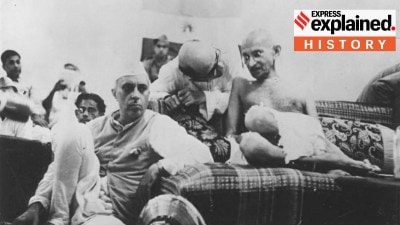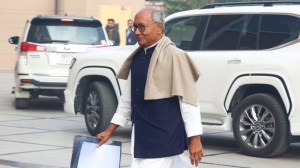Home Alone
...

But that8217;s probably because of the two burly bodyguards who tailgate him and the .32 mm pistol that rests snugly in the Ferrari8217;s glove compartment.
Along with a razor-sharp business acumen and a booming music empire, Bhushan Kumar has inherited the burden of living with fear. Seven years ago, his father Gulshan Kumar was shot in a brutal daylight murder and the memory stabs at the son8217;s life more than he would like to admit.
The youngest Kumar lives a life of near captivity at his penthouse in the industrial Mumbai suburb of Andheri. Although the threats have now receded and his mother Sudesh Kumari is secure in Delhi, her son rarely lets his guard down. He refuses to allow his house or cars to be photographed lest the license plate be recognised.
8216;8216;I often refuse interviews because my mother fears for my life. I live alone in Mumbai,8217;8217; shrugs the chairman and managing director of India8217;s largest music company. He says he prefers to keep the spotlight firmly on T-Series.
During the day, Kumar camps in his father8217;s refurbished office where he8217;s introduced quite a few changes. The desk is clean except for the sleek iMac screen and his 518221; television fits neatly into a wall unit.
The posters of devotional albums have long been torn down and replaced with those of the company8217;s latest film music acquisitions, Dil Ne Jise Apna Kahaa and Rakht.
He8217;s a workaholic, much-changed from the Mithibai collegian who was wrested from his carefree Page 3 life and thrown into the cut-throat world of the music business. 8216;8216;Father always wanted Kishan to be an actor, so the onus fell on me.8217;8217;
Within three years, however, the results were apparent. In 2000, the company8217;s profits more than doubled to about Rs 350 crore from Rs 169 crore in 1997. And last year T-Series was rated India8217;s number one music company by AC Nielson ORG Marg.
While devotional music was the main thrust earlier, it8217;s now a seasonal speciality, vigorously marketed during festivals and pujas in rural districts. And Anuradha Paudwal, the erstwhile face of T-Series, still lends her voice to the bhajans.
Although his father pioneered the remix concept8212;that8217;s right, years before Kaanta Lagaa and Chadti Jawani, T-Series released a jazzed-up version of Dum Maro Dum8212;the genre began to appeal to Kumar only two years ago. 8216;8216;When I saw other music companies profiting from them, I decided to do the same. There8217;s only so much that devotionals can bring you.8217;8217; Gingerly, Shefali Jariwala tiptoed into the market and the rest is music history.
But like the late Gulshan, Kumar is dogged by controversy. There are rumours of casting couches and unfair practices, but they are never uttered on record. The only voice of dissent in recent times was Lucky Ali over his album Kabhi Aisa Lagta Hai. Ali8217;s music videos, directed by Mahesh Mathai, were canned by Kumar only to be re-picturised by his favourite remix director Rahul L Sud. 8216;8216;Bhushan8217;s a kid,8217;8217; snorts Ali indignantly.
In 1999, Kumar erased composer Nadeem8217;s credit from the music album Sirf Tum because of his alleged involvement with Gulshan8217;s death. But, personal misgivings aside, Kumar is a force to be reckoned with in the industry.
The craftsman has consolidated his empire like a puzzle, taking bits from here and there, but mostly from other music companies. Over the years, he8217;s managed to lure the top names in the business with friendship and greenbacks. 8216;8216;I simply showed them what T-Series could do for them with its immense reach,8217;8217; says Kumar. Today, Harry Anand, Adnan Sami, Pankaj Udhas and Hans Raj Hans are all part of the T-Series flock.
The good son, who frequently flies to Delhi to tend to his mother, insists that his father was far too trusting with people.
8216;8216;He let people take advantage of him. Now I take all the decisions and I have hired only the best technicians in the industry to do my work.8217;8217; Even his item girls are hand-picked through auditions and he supervises all shoots.
At first glance, he could pass off for a rich brat with a passion for Versace, Armani, fast cars and international travel. But when he8217;s not signing deals and sifting through reams of paperwork, Kumar retires into a tiny vestibule in one corner of the cabin. On his breaks, this is where the music tycoon samples his prospective musical conquests8212;at the recording console.
The boss of 3,000 gloats about his personal relations. Starting with Sonu Nigam8212;who cut his first pop album Deewana with T-Series8212;Bhushan has made it a point to stay friends with all his creative people. 8216;8216;I challenge anyone to try and take them away from me,8217;8217; he says. After pop and film music, he8217;s now zeroed in on film production. 8216;8216;Our next film is being scripted by Sanjay Leela Bhansali8217;s sister,8217;8217; reveals Kumar, refusing to divulge more details.
But here8217;s one more teaser: T-Series is in the process of launching its very own music channel. 8216;8216;If the other companies want to join us they can; otherwise our company has enough music to keep a 24-hour channel going,8217;8217; he says.
The 10-to-10 self-policing worker claims he rarely makes an appearance at parties or goes out to dinner. His strict regimen starts at 7 am with a supervised workout, and ends late in the night with a home cooked meal. 8216;8216;I8217;ve never been to either Olive or the Vie Lounge,8217;8217; he laughs. 8216;8216;I8217;d rather eat ghar ka khaana any day.8217;8217;
- 01
- 02
- 03
- 04
- 05































